
The top ten Capacitors for automative applications
- Posted by doEEEt Media Group
- On July 10, 2020
- 0
These capacitors reflect the automotive industry’s need for smaller components packed with more performance and the capability to withstand higher temperatures found in most automotive applications
New automotive features and functionality thanks to autonomous vehicle technologies, vehicle-to-vehicle (V2V) communications, advanced driver-assistance systems (ADAS), and other safety and sensing systems like backup cameras and lane-departure detectors are all driving the demand for more electronic components. Also pushing electronic content increases are the industry’s transition to hybrid and electric vehicles.
And the demand is not just for ICs such as processors, memory devices, power semiconductors, and sensors, which have the lion’s share of a design’s cost and mindshare; passive components like capacitors are needed to ensure high stability and interference-free designs.
Click over the components below to go to the specific page in doEEEt
⇓
Non-Solid Tantalum Capacitors
Here are 10 capacitors in a variety of dielectrics that get the job done. These are not in any particular order:
1. KEMET, T598 tantalum polymer capacitors
Tantalum polymer capacitors like the T598 from KEMET Corp. are finding homes in automotive applications thanks to their low equivalent series resistance (ESR) and now higher temperature range. KEMET extended the temperature capability of its surface-mount tantalum polymer capacitor series, offering stable performance up to 2,000 hours at 125°C, which meets the lifetime requirements of about 15 years for vehicle applications.
The automotive-grade T598 capacitor series is AEC-200–qualified and offers ultra-low, single-digit ESR; high capacitance/voltage (C/V) ratings, increasing the capacitance values up to 470 µF, with voltage offerings from 2.5 VDC to 50 VDC; and leading ripple performance.
Automotive applications include ADAS features such as blind-spot detection, adaptive cruise control, and emergency brake assist, as well as safety systems such as airbag occupant detection, alarm systems, and electronic stability control. These capacitors can also be used in digitalization use cases such as supercomputing, mobility services, connectivity, and infotainment.
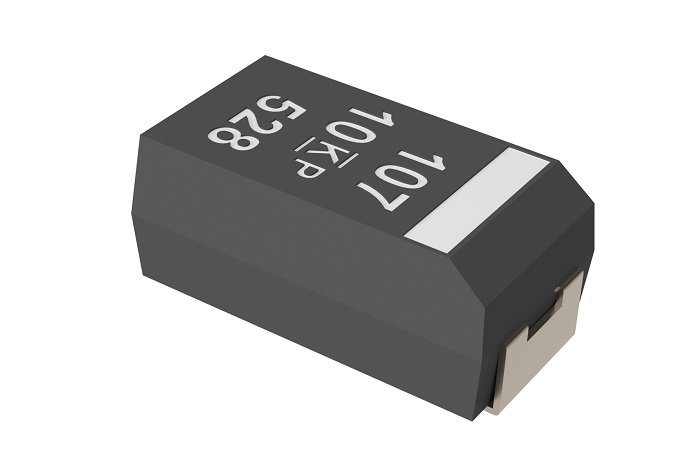
2. AVX, F9H tantalum capacitors
Similar to other tantalum capacitors, AVX Corp.’s F9H series of tantalum capacitors play a double-duty role. These capacitors are suited for harsh and high-reliability environments, targeting high-temperature automotive and industrial applications.
The AEC-Q200–qualified F9H surface-mount, J-lead tantalum capacitors offer high reliability and high volumetric efficiency. Delivering higher reliability than standard automotive-grade capacitors, the F9H parts offer a failure rate of 0.5% after 1,000 hours at 105°C and rated voltage with 0.1-Ω/V series impedance and a 60% confidence level.
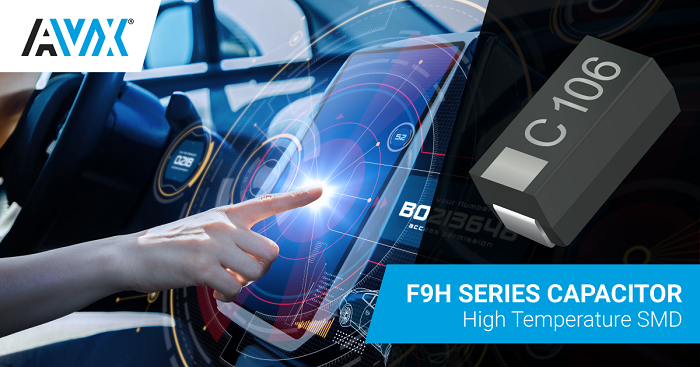
The capacitor line is rated for operation up to 150°C and claims the industry’s highest CV/cc in a high-temperature 1206 tantalum capacitor with a 10-μF/16-V rating. This is 50% more capacitance than the next-highest CV/cc 1206 tantalum capacitor at 6.8 μF/16 V.
The F9H series is currently offered with four ratings: 1206 10 μF/16 V, 1206 15 μF/10 V, 1210 22 μF/ 16V, and 2312 47 μF/16 V, with an operating temperature of 105°C at rated voltage and a maximum category temperature of 150°C at 50% of rated voltage.
The AVX capacitors offer low leakage current and do not exhibit capacitance loss with applied voltage or capacitance loss over time (as seen in Class II MLCCs and aluminum electrolytic capacitors, respectively). They are also compliant with the RoHS 2 directive 2011/65/EU.
Target applications include the secondary power lines of automotive electronics applications such as engine and transmission control units, integrated starter generators, headlamps, and brakes, as well as industrial applications
3. Taiyo Yuden, medium- to high-voltage MLCCs
Moving on to ceramic capacitors, Taiyo Yuden Co., Ltd. announced the commercialization of nine multilayer ceramic capacitors (MLCCs) for automotive and IT infrastructure equipment. These parts include a medium- to high-voltage MLCC, the HMK105B7103KVHFE, in a 1.0 × 0.5 × 0.5-mm case, with a rated voltage of 100 V and a capacitance of 10,000 pF. This is a 75% reduction in size compared to the company’s conventional MLCC, the HMK107B7103KAHT, in a 1.6 × 0.8 × 0.8-mm case.
The capacitors are compatible with AEC-Q200 and can be used in anti-noise measures and snubber applications for power supply circuits in automotive bodies and infotainment systems, as well as IT infrastructure equipment such as base-station communication devices and servers.
4. Vishay, AY1 ceramic disc capacitors
Vishay Intertechnology has claimed the industry’s first AEC-Q200–qualified ceramic disc capacitors for Class X1 (760-VAC)/Y1 (500-VAC) applications in accordance with IEC 60384-14.4. These are designed for AC line filtering and primary/secondary coupling in on-board chargers and DC/DC converters for electric vehicles (EVs), hybrid electric vehicles (HEVs), and plug-in electric vehicles (PHEVs).
The automotive-grade Vishay BCcomponents AY1 series offers high-reliability thanks to its ability to withstand 85-/85-/1,000-h biased humidity testing, 1,000 temperature cycles from –55°C to 125°C, and 10 10-kV pulses per polarity.
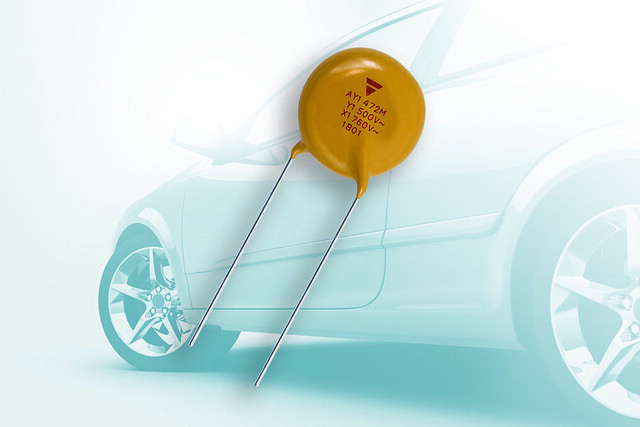
The AY1 series offers a capacitance range from 470 pF to 4,700 pF, with tolerances of ±20%. The capacitors are RoHS-compliant, halogen-free, and Vishay Green, and the encapsulation is made of flame-resistant epoxy resin in accordance with UL 94 V-0.
Vishay has also extended its existing AY2 series of automotive-grade AC line-rated ceramic disc safety capacitors with two new components offering capacitance values to 6.8 nF and 10 nF, respectively. These were the industry’s first to offer AEC-Q200 qualification for Class X1 (440-VAC)/Y2 (300-VAC) applications in accordance with IEC 60384-14.4.
5. Panasonic, ECQ-UA film capacitors
Another capacitor aimed at EVs and PHEVs is Panasonic’s ECQ-UA Series of automotive-type metalized polypropylene film capacitors for interference suppression. These capacitors can also be used in applications such as input/output filtering for charging stations or the input side of on-board chargers, as well as industrial power supplies.
The new line is based on Panasonic’s original in-house patterned metallization process with a fuse mechanism function to deliver higher reliability and stable capacitance over the product’s lifetime. The devices are AEC-Q200–qualified and deliver high humidity resistance (temperature humidity bias [THB] test: 85°C, 85%, 240 VAC, 1,000 hours) and high thermal shock resistance (–40°C to 85°C, 1,000 cycles).
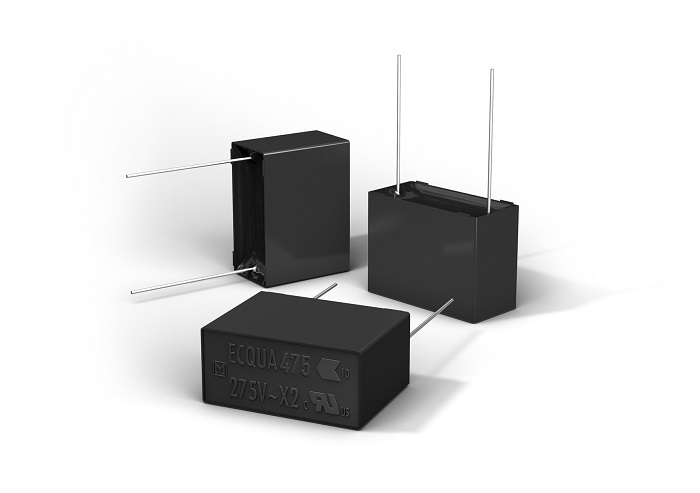
The ECQ-UA Series is available with a capacitance range of 0.1 μF to 4.7 μF, with a rated voltage of 275 VAC, extendable to 305 VAC for short periods. The operating temperature range is –40°C to 110°C.
The use of a flame-retardant plastic case and non-combustible resin are attributed to the series’ accreditation in accordance with UL/CSA and European safety regulation for Class X2. All of the products are RoHS- and REACH-compliant.
6. Vishay, F339X2 305VAC film capacitors
Another electromagnetic interference (EMI)-suppression automotive-grade film capacitor is available from Vishay. The F339X2 305VAC series of X2 EMI suppression film capacitors for standard-across-the-line applications (50 Hz/60 Hz) is used as EMC filters for automotive and industrial power inverters.
The F339X2 305VAC devices from Vishay BCcomponents are qualified to both AEC-Q200 (rev. D) and IEC 60384-14: 2013/AMD1: 2016 grade IIB. The parts withstand THB testing of 85°C, 85% RH for 500 hours at rated voltage with high stability on capacitance and dissipation factors to meet the new humidity grading system defined under IEC 60384-14: 2013/AMD1: 2016 grade IIB. Vishay said that this rating enables the devices to deliver “greater robustness and longer service life in harsh application conditions.”
The series offers capacitance values from 0.1 μF to 4.7 μF, with tolerances down to ±10% and a permissible DC voltage of 630 V. Lead pitches are available at 15 mm, 22.5 mm, and 27.5 mm.
The encapsulation of the film caps consists of a flame-retardant UL-class 94 V-0 plastic case, which is epoxy resin-sealed. The lead-free devices are RoHS-compliant.
7. KEMET, C4AQ power film capacitors
For high-power and high-frequency applications, two of KEMET’s latest series of power film capacitors meet the requirements of AEC-Q200 for automotive applications. The C4AQ series can also be used in industrial and power supply designs for DC link, DC filtering, and energy storage applications, while the C4AF series is specifically designed for harsh environments in similar applications.
Featuring a polypropylene metalized film construction, the capacitors are available as two or four radial leaded board-mount devices. The capacitance range for the C4AQ series is 1.0 µF to 130 µF, with additional sampling for 170 µF and 210 µF. The voltage values range from 500 VDC to 1,500 VDC. Designed for harsher environments, the C4AF series offers a capacitance range up to 62 µF, with voltage ratings up to 400 VAC. The operating temperature range for the C4AQ/C4AF capacitors is –55°C to 105°C.
The RoHS-compliant capacitors are housed in rectangular, resin-filled enclosures and feature self-healing characteristics and low losses. Other features include high ripple current values, high capacitance density, and high contact reliability, said KEMET.
8. Panasonic, EEH-ZS hybrid capacitors
Technology and process advances are also achieved in the aluminum-electrolytic industry. Panasonic expanded its conductive polymer hybrid aluminum-electrolytic capacitor product line with the launch of the EEH-ZS Series, targeting the automotive sector. All EEH-ZS Series products meet AEC-Q200 and are compliant to RoHS and REACH regulations. The series offers an expanded capacitance range, doubles the ripple current capability, and is rated at 4,000 hours of endurance at 125°C.
The EEH-ZS family offers a capacitance range of 150 µF to 560 µF, with rated voltages from 25 V to 63 V. Other key specs include a lower ESR down to 11 mΩ, with a ripple current of 4 Arms. The lower ESR and higher ripple enhance filter and DC-link circuits in automotive control and powertrain applications, said Panasonic. These devices can also be used as replacements for other capacitor types such as larger MLCCs, aluminum electrolytics, or tantalums.
The EEH-ZS Series offers new case sizes and introduces hybrid capacitors that are 16 mm in length. The series also offers vibration-proof variants for parts with an 8-mm diameter or greater.
9. Nichicon, PCZ polymer aluminum-electrolytic capacitors
Another new conductive polymer aluminum solid electrolytic capacitor was introduced by Nichicon Corp. earlier this year. The PCZ series of chip-type capacitors offers an operating temperature of up to 150°C with a life expectancy of 2,000 hours. The new series improves the heat-resistance technology used in the previous PCH series, which offered a guaranteed temperature of 135°C.
![]()
The PCZ series enhances the heat-resistance technology used in the PCH series that featured the highest guaranteed temperature of 135°C before the introduction of the PCZ series. Now, the PCZ capacitors offer low ESR in the temperature range of 150°C.
Other improvements over the PCH series include optimization of conductive polymers, improvement of the self-healing features of aluminum oxide films, and refinement of the sealing technology, said Nichicon. All of these improvements contribute to the guaranteed operation of 2,000 hours at 150°C while maintaining low ESR and high allowable ripple current.
The rated capacitance range is 100 µF to 330 µF, with a voltage range of 25 VDC to 35 VDC. The operating temperature range is –55°C to 150°C.
10. TDK, B41897 aluminum-electrolytic capacitors
TDK Corp. has expanded its aluminum-electrolytic capacitor line with the EPCOS B41897 series. These single-ended aluminum-electrolytic capacitors provide a high C/V value and high-ripple-current capability. The capacitance range is 270 µF to 12,000 µF, with rated voltages of 25 VDC and 75 VDC. Package sizes range from 12.5 × 20 mm to 18 × 40 mm, depending on the voltage and capacitance ratings.
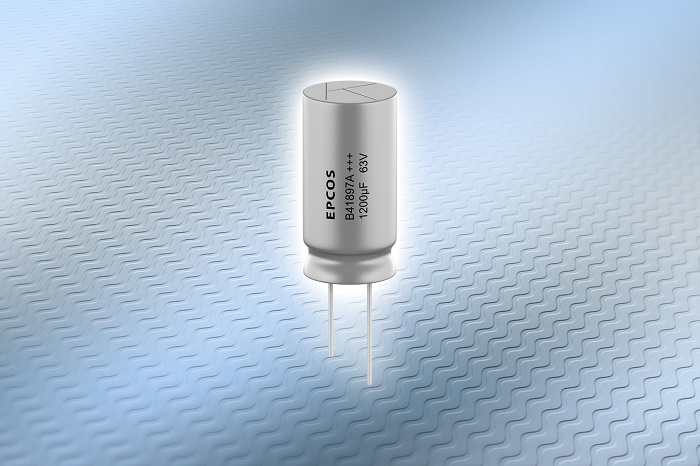
TDK also used improved materials to gain a higher temperature range, designing the B41897 capacitors for continuous operation up to 135°C and for a peak temperature of 150°C. In addition, the company has increased the ripple current capability while raising the capacitance by as much as 60% compared to the previous series. The maximum ripple current capability is now higher than 7 A at 125°C and 100 kHz. These new capacitors can be used in automotive electronic control units (ECUs) and power supplies.
Source: Electronic Products article
By Gina Roos.
- Space-Grade components available for immediate delivery - April 10, 2025
- Exclusive stock on doEEEt: How to access and request - April 10, 2025
- Managing EEE components for LEO and lower cost space missions - December 17, 2024

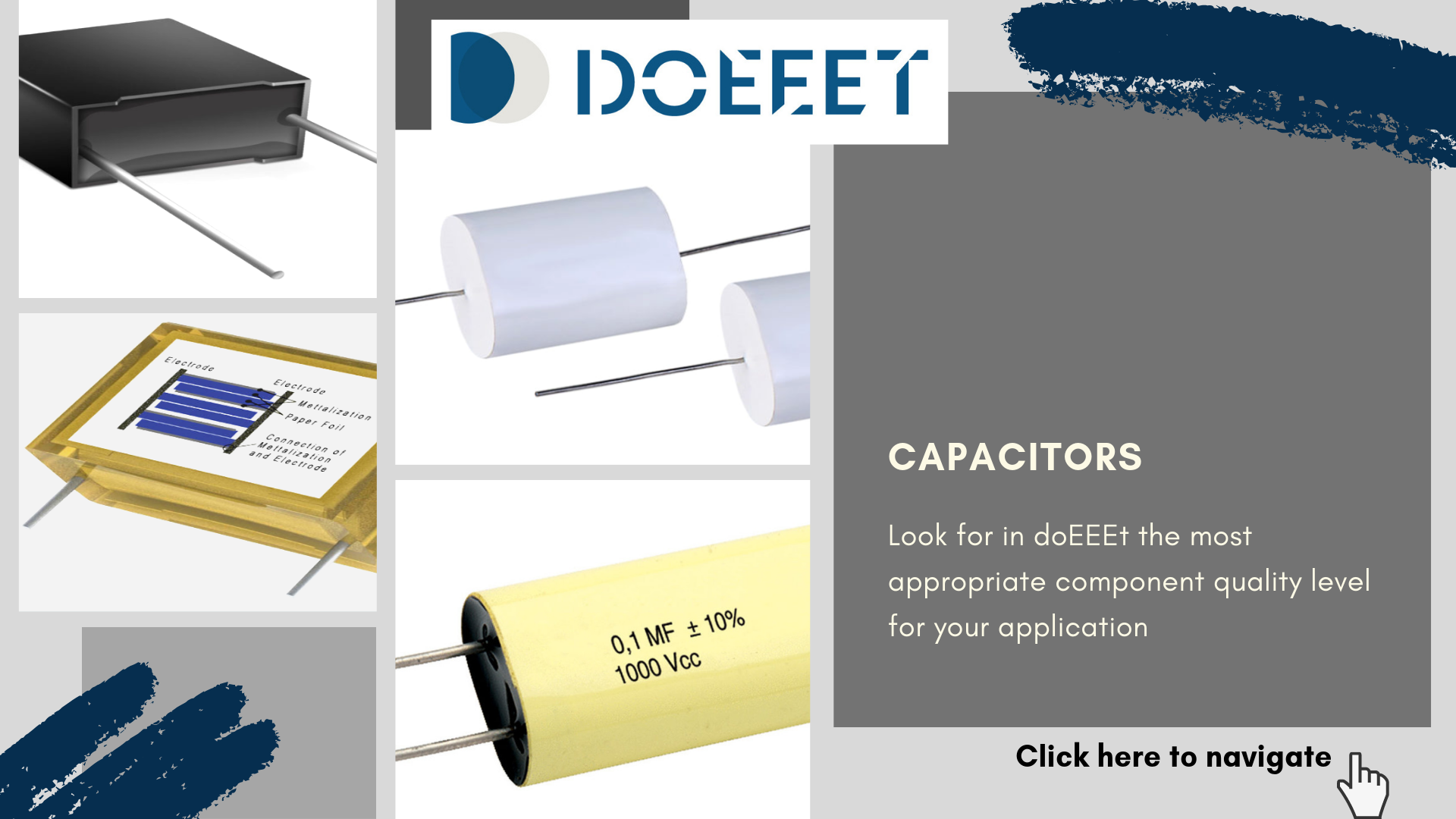
0 comments on The top ten Capacitors for automative applications